New Right to Rise ad focuses on Jeb Bush vow to “disrupt the beast”
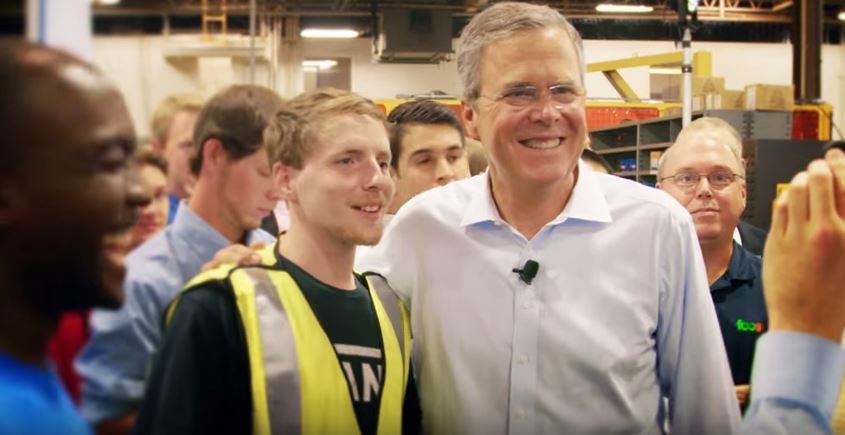
A new TV spot from the super PAC supporting Jeb Bush hits the New Hampshire airwaves this week promoting the Republican presidential candidate’s history of disrupting politics as usual. First reported in CBS News, “Town Hall” is a 30-second spot produced by Right to Rise USA, which will start running in the first-in-the-nation primary state. The ad features a strong anti-establishment message. “We need to disrupt the old order in Washington, D.C.,” says Bush in the spot, over a photo of President Obama and Hillary Clinton. Next is a variety of clips showing Bush campaign events to spotlight the former governor’s conservative record along with reviews of his recently announced tax plan. “We can do a lot better by applying conservative principles,” Bush, says. “What we need is leadership to fix a few big things so that this country takes off and soars.” Bush, who struggles in recent polling against other GOP political outsiders — Donald Trump, Ben Carson and Carly Fiorina – has been campaigning in Iowa this week, emphasizing his record as a “disrupter” to voters who seemingly favor rivals from outside the Washington beltway. “I’ve never lived in Washington, never been part of Washington,” he said at an Iowa event on Wednesday. “I just have the skill set to disrupt the beast.” Right to Rise bought airtime in New Hampshire, and another version of the ad will run in Iowa, campaign spokesperson Paul Lindsay told CBS News. The PAC’s media blitz includes $37 million spent on ads in early state races, scheduled to run through February. “Town Hall” is part of that new buy.
Anonymous donors send millions to pro-Marco Rubio group
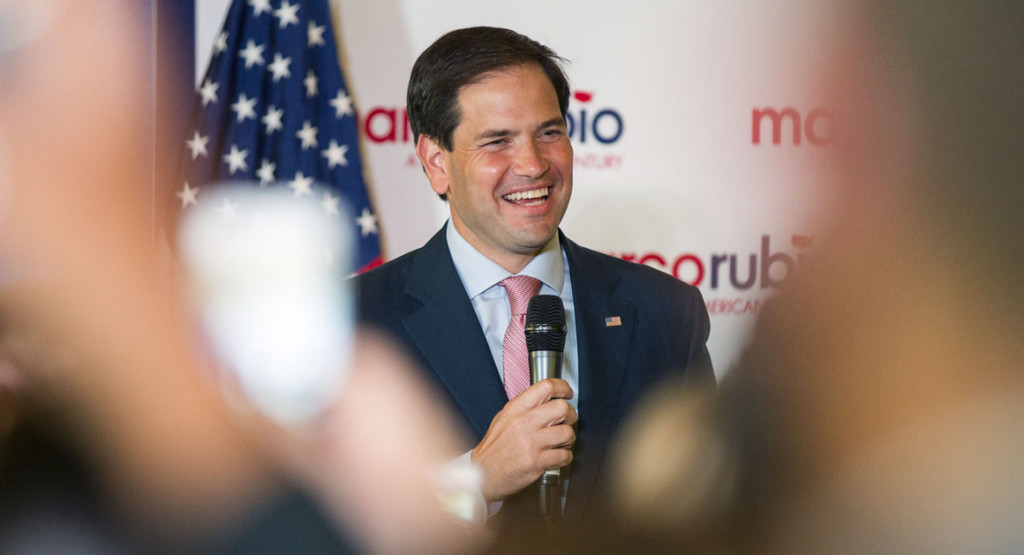
Voters are beginning to learn about Republican presidential hopeful Marco Rubio. What they’re not learning, however, is who is paying to promote his candidacy. The Florida senator is benefiting in unprecedented ways from a nonprofit group funded by anonymous donors. While other presidential candidates also have ties to secret-money groups, the Rubio arrangement is the boldest. Every pro-Rubio television commercial so far in the early primary states of Iowa, New Hampshire and South Carolina has been paid for not by his campaign or even by a super PAC that identifies its donors, but instead by a nonprofit called Conservative Solutions Project. It’s also sending Rubio-boosting mail to voters in those same states. Rubio is legally prohibited from directing the group’s spending, and he has said he has nothing to do with it. But there’s little doubt that Conservative Solutions Project is picking up the tab for critical expenses that the campaign itself might struggle to afford. Although Rubio is rising in national polls, his fundraising has so far been dwarfed by that of former Florida Gov. Jeb Bush, Texas Sen. Ted Cruz and retired neurosurgeon Ben Carson. By the end of June, Bush and his super PAC had amassed $114 million – more than quadruple what Rubio and his super PAC collected. Ahead of what is expected to be a new and disappointing fundraising report next week, Rubio’s aides have stressed that their thriftiness gives them a competitive advantage over campaigns with more money. Left unsaid was that a secret-money group is giving him at least an $8 million assist, according to information provided by advertising tracker Kantar Media’s CMAG. The candidate has presented himself as being opposed to such unaccountable money. “I believe that – as long as it’s being disclosed – that people have a right to participate in our political process,” Rubio said in June at a voter forum in New Hampshire when asked about “the corrupting influence” of money in politics. Conservative Solutions Project does not disclose its donors. Its latest commercial shows Rubio, 44, speaking at the Iowa State Fair. “New ideas for a new age,” a narrator says before ticking through a list of Rubio priorities: “throw out the tax code, overhaul higher education, repeal and replace Obamacare.” Conservative Solutions Project has put $2.3 million into the 30-second ad over the past three weeks and is on deck to spend close to another $1 million keeping it on the air next week, according to CMAG information about advertising placements on broadcast, cable and satellite television. That follows a $3 million summertime ad campaign by the same group that promoted Rubio’s strong opposition to a deal the White House and other countries struck with Iran on nuclear weapons. Conservative Solutions Project also has reserved nearly $2 million in additional satellite TV advertising space through Feb. 16, according to the advertising tracker. Although numerous candidates may ultimately benefit from allied nonprofits, so far it appears that only the entities helping Rubio and Louisiana Gov. Bobby Jindal are advertising in the presidential race. America Next has spent about $380,000 boosting Jindal on TV, CMAG said. Bush also has a secret-money group in his corner, but it hasn’t yet directly communicated with voters. Nonprofits are the edgier cousins of super PACs. Both can accept unlimited amounts of money from wealthy donors, corporations and unions, but only nonprofits can keep those names a secret. In exchange for that privilege, nonprofits are barred from making political activity their primary purpose. But gray area abounds. The two regulating agencies, the Federal Election Commission and the Internal Revenue Service, have been less than aggressive in pursuing potential violators. The Campaign Legal Center in Washington is suing the FEC for failing to require a nonprofit that was active during the 2012 presidential election to file finance reports. “Congress, the Supreme Court and the public have all recognized that voters have a right to know who is spending money to try to influence them on Election Day,” said Paul S. Ryan, the center’s senior counsel. “Transparency is how we hold politicians accountable and make sure they’re not in the pocket of their benefactors.” That’s in line with public opinion: Seventy-five percent of voters, an equal share of Democrats and Republicans, said contributors to unaffiliated groups should be disclosed, according to a CBS News/New York Times poll in June. The Conservative Solutions Project declined to say who gave it the $16 million it claims to have. Although it shares a name and key personnel with the Rubio-focused super PAC, Conservative Solutions PAC, its mutual spokesman, Jeff Sadosky, said the two are “very separate and distinct groups.” He said the nonprofit’s work goes well beyond Rubio’s presidential ambitions, pointing to a detailed study it did last year of voter behavior, which was made available on its website. Additionally, Sadosky said, Conservative Solutions Project highlights on its website the work of other conservative leaders, including Illinois Sen. Mark Kirk and Arkansas Sen. Tom Cotton. But its bent toward Rubio is apparent even there: Visitors to the site are immediately routed to a video of the Florida senator speaking, the same footage on television in early primary states. Republished with permission of the Associated Press.
Rupert Murdoch suggests Barack Obama isn’t ‘real black president’
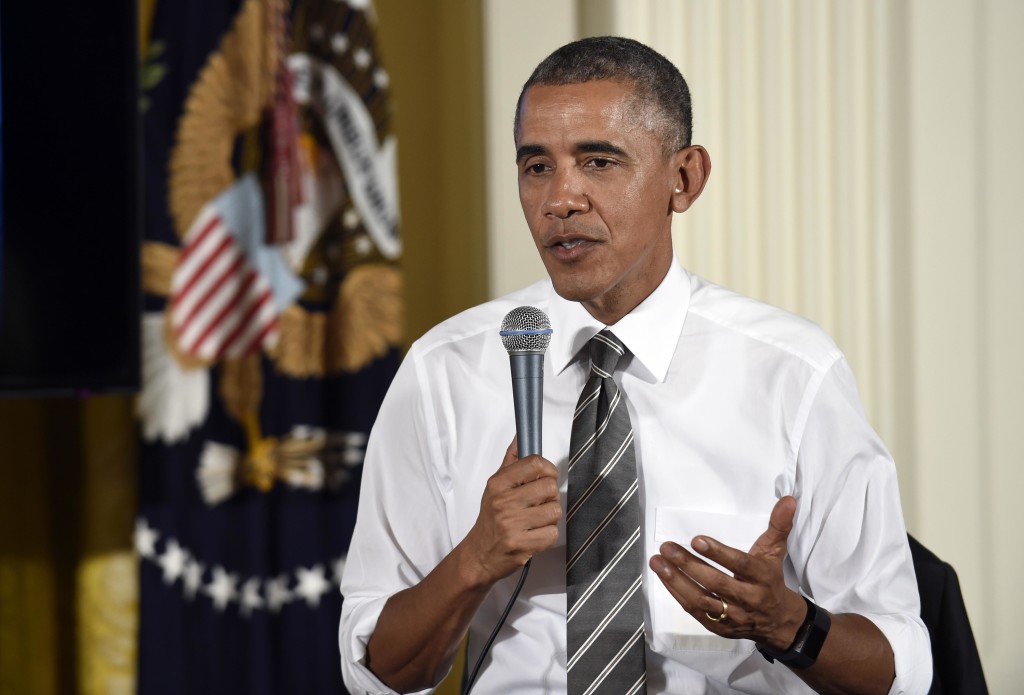
The founder of the global News Corp. media empire, Rupert Murdoch, is suggesting that President Barack Obama isn’t a “real black president.” Murdoch was praising Republican presidential candidate Ben Carson and his wife on Twitter Wednesday evening when he wrote: “Ben and Candy Carson terrific. What about a real black President who can properly address the racial divide?” Later, Murdoch recommended a New York magazine article asking whether Obama has done enough for the African-American community. Murdoch is the founder of Fox News Channel, and News Corp’s publications include The New York Post and The Wall Street Journal. The 84-year-old Murdoch has praised Carson on Twitter before, calling him “irreproachable on background, achievements, character, vision.” Republished with permission of the Associated Press.
New PPP national survey has Donald Trump up by 10 points
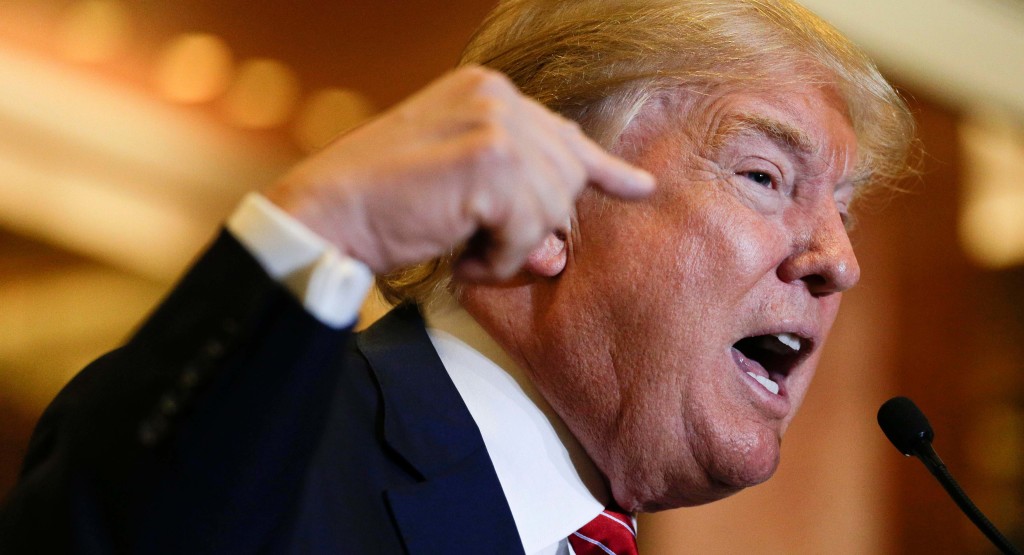
Donald Trump may or may not have already peaked in the Republican presidential contest, but no other candidate gets close to him in yet another national poll of GOP candidates released on Tuesday. The Public Policy Polling survey has Trump up with 27 percent support. Ben Carson is in second place with 17 percent, and Marco Rubio is next with 13 percent. These are all numbers that were roughly the same as when PPP conducted their last survey back in early September. Rounding out the field in fourth place is Jeb Bush with 10 percent, Ted Cruz is at 7 percent, Carly Fiorina is at 6 percent, and Mike Huckabee and John Kasich are each at 4 percent round out the list of candidates with with decent levels of support. Chris Christie, Rand Paul, and Rick Santorum are all at 2 percent, Lindsey Graham, Bobby Jindal, and George Pataki each get 1 percent, and in last place with less than 1 percent is Jim Gilmore. PPP says that Rubio “is really the only candidate who can claim any sort of momentum.” They say that because he’s gone from 5th place at 7 percent to 3rd place at 13 percent over the last five weeks. And he has a 57/24 favorability rating that puts him only behind Ben Carson when it comes to the most broadly liked of the Republican hopefuls. No one other than Rubio has seen more than a 2 point gain since our last poll. Florina’s six percent showing is down two points from a month ago, indicating that her No one’s really lost much ground in the last month either. The biggest decline anyone has seen in their support is 2 points- Trump, Fiorina, and Kasich have all seen that minor dip in the last month. Fiorina being at 6% after registering at 8% on our national poll in late August does suggest that whatever benefit she received from her strong debate performance last month may have already receded. Bush’s 10 percent showing is actually slightly up from a month ago and puts him in the top four, but he’s becoming more and more unpopular with Republican voters overall. Just 34 percent have a favorable opinion of him to 49% with a negative one. His struggles continue to be fueled by strong distrust from voters who identify themselves as ‘very conservative’- his favorability with them is 26/56 and only 2 percent support him for the nomination. Most interestingly, Republican primary voters are more liberal than all of the candidates when it comes to gun control and the economy. Eight-two percent of primary voters support background checks on all gun purchases, to only 13 percent opposed. Supporters of all 15 GOP hopefuls are in support of expanded background checks, including 82/18 support for them from Bush voters. There’s also 54 percent support among GOP voters for increasing the minimum wage to at least $10 an hour. Only 26 percent support keeping it where it is right now and 18 percent support eliminating the federal minimum wage altogether.
Donald Trump on Oregon shootings: “You’re always going to have problems”
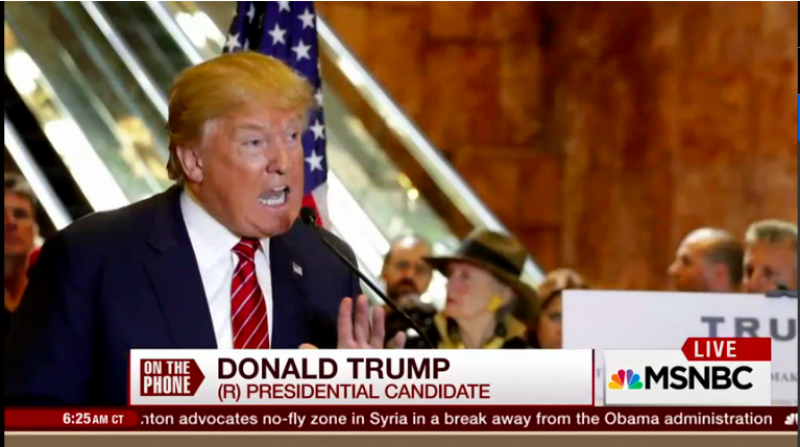
Republican presidential candidate Donald Trump on Friday said the most recent campus shooting in Oregon could have happened anywhere, adding that there are already “very strong laws on the books” to address gun violence. Trump joined MSNBC’s “Morning Joe” program by phone – his 13th time on the show, either in person or on the phone, since declaring himself a candidate for 2016. He spoke the day after a 26-year-old man walked into a morning class at Umpqua Community College in rural Oregon and opened fire, hitting some students with multiple gunshots. At least nine people were killed and seven others were wounded. Co-host Willie Geist asked Trump what he would have done if the shooting happened under his presidency, noting that Oregon has universal background checks. “Well first of all, you have very strong laws on the books, but you’re always going to have problems,” Trump said. “I mean, we have millions and millions of people. We have millions of sick people all over the world. It can happen all over the world. “And it does happen all over the world, by the way, but this is sort of unique to this country, the school shootings, and you’re going to have difficulty no matter what,” he added. “I mean … probably we’ll find out with him, like we did with numerous of the others, that gee whiz, they were loners and they were probably sick. “You know, oftentimes this happens and the neighborhood says, you know, we sort of saw that about him and it really looked like he could be a problem. But it’s awfully hard to put somebody in an institution for the rest of their lives based on the fact he looks like he could be a problem. So it’s a terrible situation, it’s huge mental illness. You’re going to have these things happen and it’s a horrible thing to behold.” Geist asked, “So Donald, is it fair to say then that your opinion is some people are going to slip through the cracks and there’s not much you can do about it?” Trump responded, “… People are going to slip through the cracks and even if you did great mental health programs, people are going to slip through the cracks … What are you going to do? Institutionalize everybody? So you’re going to have difficulties … with many different things, not just this. That’s the way the world works. And by the way, that’s the way the world always has worked, Willie.” Trump also addressed remarks about him by Democratic presidential contender Hillary Clinton, discussed whether Congressman Kevin McCarthy should be the next speaker of the U.S. House of Representatives, and sized up fellow GOP candidate Ben Carson. A link to the video is here: https://on.msnbc.com/1M5ZCVu Material was used from The Associated Press in this post.
Jeb Bush donors pitch ‘long haul’ after initial ‘shock and awe’
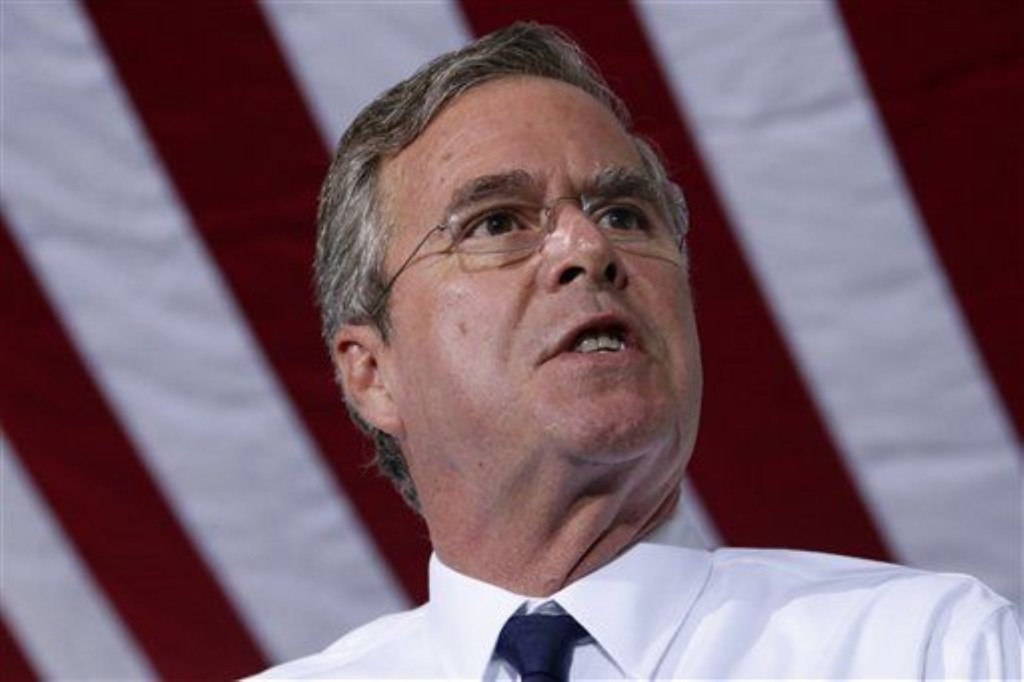
Jeb Bush‘s challenge in the first half of the year was daunting yet simple. To be considered a fundraising success, the Republican presidential candidate had to hit the magic number of $100 million, an ambitious goal set by some in his campaign. And he did. As another fundraising period ends, what now constitutes success for Bush isn’t as clear cut. No longer the front-runner in preference polls, Bush won’t repeat as the champion at raising money in the GOP’s 2016 field, lapped in the past three months by retired surgeon Ben Carson and perhaps by Texas Sen. Ted Cruz, too. “They created such a high bar,” said Spencer Zwick, a top Republican donor who was 2012 GOP presidential nominee Mitt Romney‘s finance chief. “Now anything less than $100 million in a quarter seems small.” But Bush’s financial team and strategists argue that he should now be judged by a different benchmark. Their mantra: He’s built to last. Using phrases like “go the distance,” ”marathon” and “long haul,” they argue that the former Florida governor is uniquely positioned to outlast other candidates, regardless of the fundraising number he posts for the third quarter. “If we were frozen with just the resources we have right now, he could still be in the game right to the very end,” said Kenneth Lipper, a New York financier and top fundraiser for Bush. “Longevity is the right word.” Bush’s finance team describes his fundraising in the past three months as “respectable” and “fine,” while declining to provide the specifics on just how much they raised. That detail will come later this month in a report filed with federal regulators. It’s true that the summer months of the year before the election are typically the bleakest time for candidates to raise money. Romney collected $14.2 million during the same period in 2011, the least of any three-month period between the beginning of his campaign and when he secured the Republican presidential nomination. Yet the summer didn’t slow down Carson, who has never run for office and has raised $20 million since July. Bush aides say they also expect to be topped by Cruz, the Texas senator with unvarnished contempt for his own party’s leadership and an enthusiastic tea party following. Bush has scored harder-to-measure fundraising gains, such as winning the support of Anthony Scaramucci, a national fundraising leader for former candidate Scott Walker. Next week, Bush heads back to Chicago, where he quickly converted former Romney supporters early this year, for a series of fundraisers hosted by wealthy donors who helped get his super PAC soaring. Bush’s fundraising still has a distinctly presidential look, in part because it includes so many who raised money for his father and brother. Bush’s major donors will gather in Houston at the end of the month for a “Jeb celebration” that includes Presidents George H.W. and George W. Bush. “For others, stardom is ephemeral. I’m very happy to see Jeb hold his own,” said Fred Zeidman, a Houston businessman raising money for Bush. “We have the most money and we can outlast. He’s showing the discipline of a long-term candidate.” Unlike Walker, who dropped out of the race because he couldn’t raise enough money to pay for his 100-employee political operation, Bush’s campaign fundraising and campaign scale are in sync, his donors said. That doesn’t mean they are comfortable where they are, or expect to be any time soon, said longtime Bush supporter Al Hoffman, the founder of Florida’s largest real estate development company. “We’re all worried. That’s what we do, we worry all the time,” Hoffman said. “But it’s a healthy sense of anxiety that we can always do more that keeps us going.” Craig Duchossois, a Chicago-area private equity investor and Bush donor, said national polls showing Bush in single digits unnerves some less-seasoned donors. He admits some movement this fall by Bush in early-voting state surveys “certainly would be encouraging.” But he argues that more than anything else, success for Bush at this stage is raising enough money for his actual campaign to stay in the race and take advantage of his super PAC. Helped by two dozen million-dollar checks, it amassed $103 million in donations through the end of June — more than double any other candidate-specific super PAC. “Let me suggest to you that fundraising is not the metric as important for Jeb as it is for everyone else,” said Duchossois, who hosted an event for Bush’s super PAC in February. “Jeb’s goal, and what we consider success, is getting his message across.” Bush, who as a candidate can no longer direct the super PAC, left it in the hands of his top media strategist, Mike Murphy. It has started spending its millions introducing Bush as “a committed conservative” to voters in Iowa, New Hampshire and South Carolina. The tentacles of the official campaign, which also just began advertising, have spread well beyond those early voting states. That’s partly why Austin Barbour said he joined Bush’s campaign after former Texas Gov. Rick Perry, the candidate he’d been helping, dropped out last month. Barbour will help Bush organize a push for wins on March 1, when voters in a dozen states including Texas and Virginia cast their primary ballots. “The campaigns that have the resources to go deep into April,” Barbour said, “those are the ones that are going to survive and thrive. You’ve got to be prepared to go the distance.” Republished with permission of the Associated Press.
Conservatives to 2016 GOP field: Defy us at your own peril
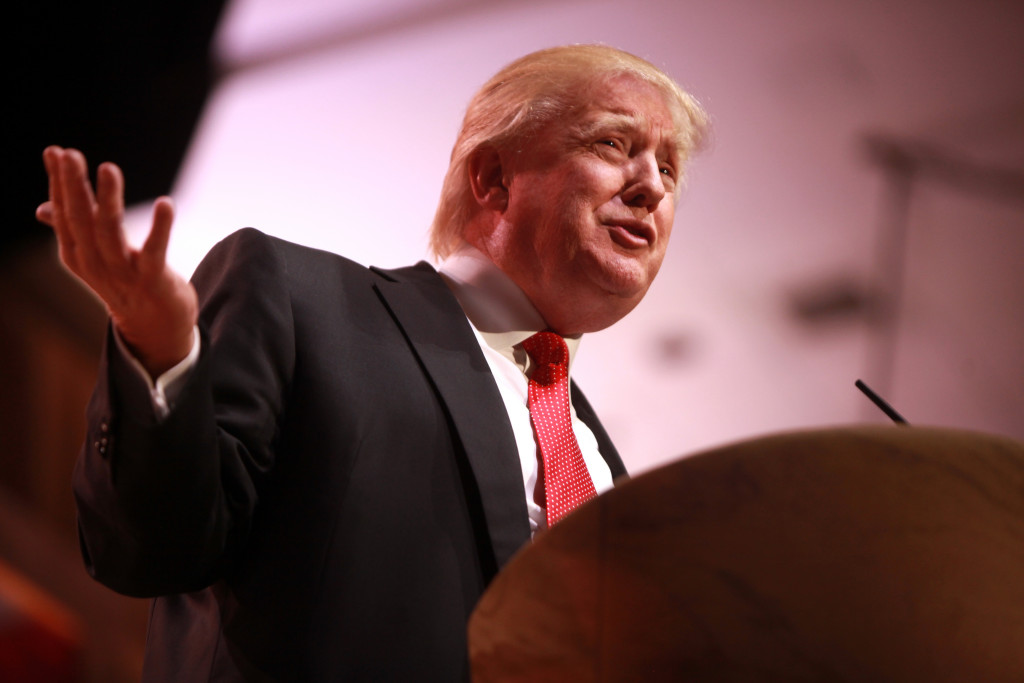
The Republican Party’s conservative wing, pumped up by House Speaker John Boehner‘s stepping down, is warning the 2016 presidential candidates that defying its wishes will come at their peril. Religious activists forcefully conveyed this message Saturday: embrace our uncompromising stance against abortion rights and gay marriage, among other priorities, even if doing so risks a federal government shutdown. An emboldened conservative movement signals fresh trouble for White House candidates viewed by the party’s frustrated base as insufficiently committed to their cause. Chief among them is former Florida Gov. Jeb Bush. “Conservatives are on fire at the moment,” said Gary Bauer, a former president of the Family Research Council. He was among the featured speakers at the Values Voter annual conference that brought an estimated 2,000 evangelical activists to Washington this weekend. Boehner’s announcement that he would resign from Congress by the end of October came without warning Friday, nearly four months before voting begins in the presidential primary. His decision revealed a deep divide within the GOP that raises questions about the party’s ability to unite behind one candidate next spring. Hard-line conservatives were deeply disappointed with the last two Republican presidential nominees – former Massachusetts Gov. Mitt Romney and Arizona Sen. John McCain. Boehner was unpopular among conservative activists, and his resignation will give them new hope that the party may choose a candidate who energizes the most passionate voters, even if that nominee is seen as less attractive to a general election crowd. A co-founder of the tea party movement said Boehner was just another of the establishment figures taken down by frustrated conservatives. “Today, the insurgency is more emboldened than ever and looks to even further dominate the presidential elections in 2016,” said Mark Meckler. “Our influence is growing.” In the crowded hallways of the Values Voter conference, 60-year-old Alvin Kaddatz said the turmoil on Capitol Hill sends a clear message to the presidential field. “They need to be listening to what the people are saying,” said Kaddatz, who sells farm equipment in Hillsboro, Texas. “They need to follow through on their promises. And if they don’t, elections have consequences.” It’s unclear whether grass-roots conservatives can back up their tough talk. But in an undeniably anti-establishment climate, the leading presidential contenders appear to be complying, for now. Most support a tea party-backed measure to strip federal dollars from the women’s health care provider Planned Parenthood as part of budget negotiations, even if such a move causes a partial government shutdown as early as this coming week. Polls show a majority of voters oppose such brinkmanship over this issue. Republicans were largely blamed the last time government shutdown over funding for the Affordable Care Act, which lasted 16 days in 2013. Who’s indicated a willingness to take it that far? Businessman Donald Trump; Sens. Marco Rubio of Florida and Ted Cruz of Texas; former technology executive Carly Fiorina; retired neurosurgeon Ben Carson; former Arkansas Gov. Mike Huckabee; Govs. Bobby Jindal of Louisiana and Chris Christie of New Jersey; and former Pennsylvania Sen. Rick Santorum. All those in the race want to strip the money from Planned Parenthood, but only a few want to do that without risking a shutdown. Put Bush and Ohio Gov. John Kasich in this category. That does little to help’s Bush’s standing with conservatives, already skeptical of his commitment to their principles. Bush was a noticeable omission from the Values Voter speaking program. He cited a scheduling conflict. Tony Perkins, president of the Family Research Council, which hosted the weekend conference, was surprised by Bush’s absence. “He needs to do well with this voting bloc,” Perkins said of social conservatives. “Especially where he’s at now in the polls. He needs all the help he can get.” Bush’s team cited 14 public and private meetings with religious conservative leaders since April, suggesting that his absence from the Values Voter summit did not signal a lack of commitment to their priorities. For Arlie Olsen, 64, who raises pigs in Blooming Prairie, Minnesota, Boehner’s departure was “a good omen for where the country may be headed.” Olsen offered a message to his party’s 2016 class: “It is going to be really hard for a candidate to win if they don’t have the backing of this group.” Republished with permission of the Associated Press.
Republican presidential hopeful Ben Carson blames “PC culture”
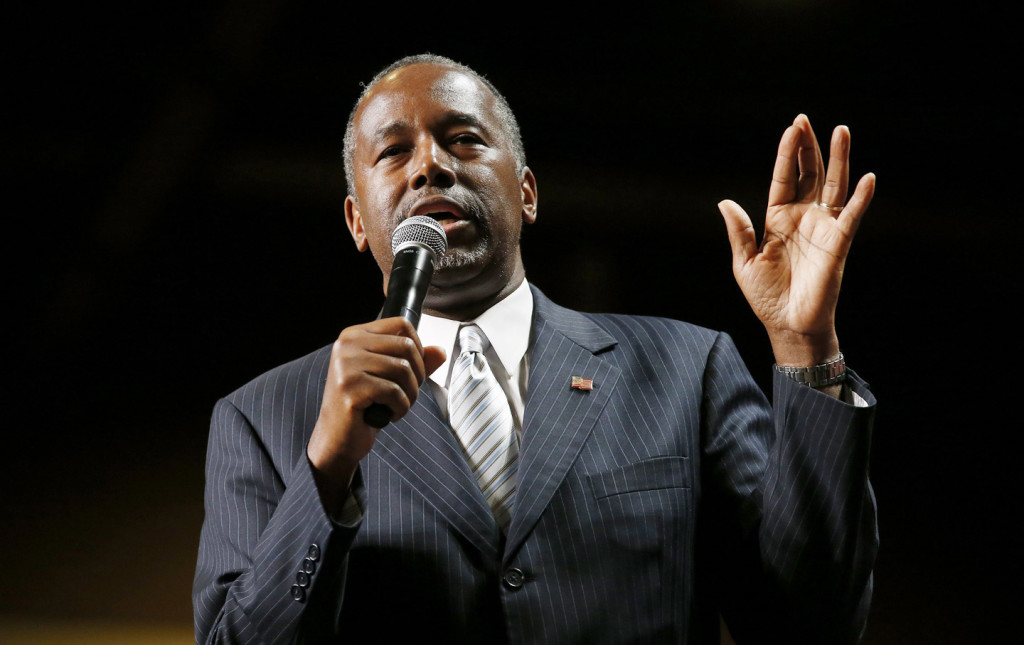
Republican presidential candidate Ben Carson says “P.C. culture” is to blame for the fallout over his statement against electing a Muslim president. Carson tells reporters in Ohio on Tuesday that his view is that anyone wanting to be president must embrace the Constitution and American principles. He says anyone who does can be president. Carson adds that would also oppose a Christian for president who wanted to establish a theocracy. To recover from the controversy, the retired neurosurgeon said he’d have to fix “a P.C.”— or politically correct — “culture.” Carson called the Muslim president issue a “theoretical” question that’s distracting from important problems. Republished with permission of the Associated Press.
GOP candidate Ben Carson: Muslim shouldn’t be elected president
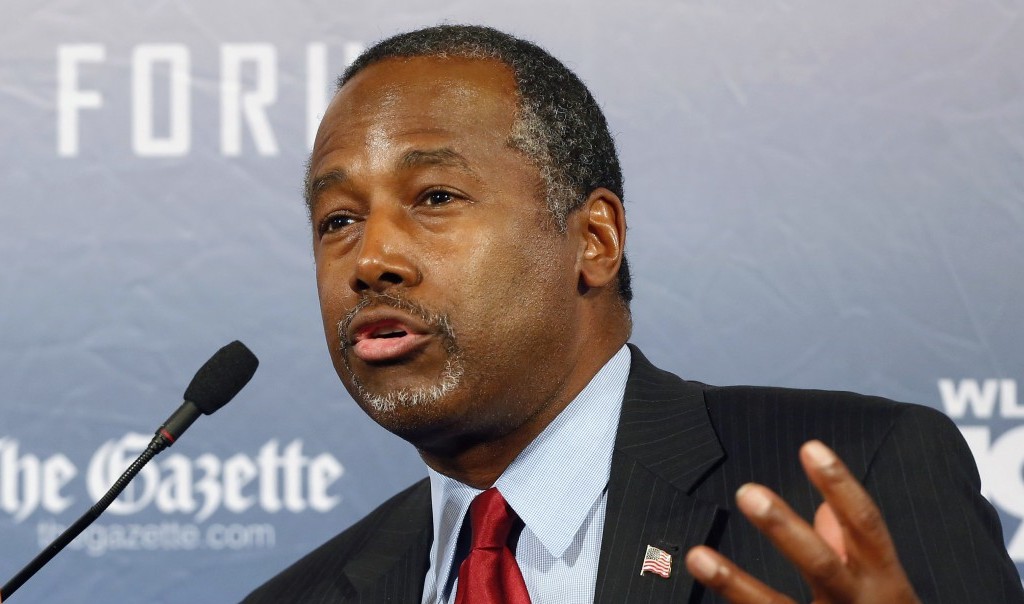
Republican presidential candidate Ben Carson says Islam is antithetical to the Constitution, and he doesn’t believe that a Muslim should be elected president. Carson, a devout Christian, says a president’s faith should matter to voters if it runs counter to the values and principles of America. Responding to a question during an interview broadcast Sunday on NBC’s “Meet the Press,” he described the Islamic faith as inconsistent with the Constitution. “I would not advocate that we put a Muslim in charge of this nation,” Carson said. “I absolutely would not agree with that.” He did not specify in what way Islam ran counter to constitutional principles. In a separate appearance on NBC, one of Carson’s rivals for the GOP nomination, Ohio Gov. John Kasich, was asked whether he would have a problem with a Muslim in the White House. “The answer is, at the end of the day, you’ve got to go through the rigors, and people will look at everything. But, for me, the most important thing about being president is you have leadership skills, you know what you’re doing and you can help fix this country and raise this country. Those are the qualifications that matter to me.” Carson’s comments came amid lingering fallout over Republican Donald Trump‘s refusal last week to take issue with a man during a campaign event who wrongly called President Barack Obama a Muslim and said Muslims are “a problem in this country.” Also speaking on NBC on Sunday, Trump said that a Muslim in the White House is “something that could happen… Some people have said it already happened, frankly.” In multiple interviews Sunday, Trump tried to draw a distinction between all American Muslims and extremist Muslims in the U.S. and elsewhere. “I have friends that are Muslims they’re great people, amazing people,” Trump said on CNN’s “State of the Union.” “You have extremists Muslims that are in a class by themselves,” Trump added. “It’s a problem in this country it’s a problem throughout this world….You do have a problem with radical Muslims.” GOP candidates have since been split over whether to criticize Trump, who has been a vocal skeptic of Obama’s birthplace and faith. Obama is Christian. In the NBC interview, Carson said he believes that Obama was born in the U.S. and is Christian, saying he has “no reason to doubt” what the president says. Carson also made a distinction when it came to electing Muslims to Congress, calling it a “different story” from the presidency that “depends on who that Muslim is and what their policies are, just as it depends on what anybody else says.” Congress has one Muslim member, Democratic Rep. Keith Ellison of Minnesota. “If there’s somebody who’s of any faith, but they say things, and their life has been consistent with things that will elevate this nation and make it possible for everybody to succeed, and bring peace and harmony, then I’m with them,” Carson said. Republished with permission of the Associated Press.
CBS/NYT poll: Donald Trump still leads, but Ben Carson makes strong gains
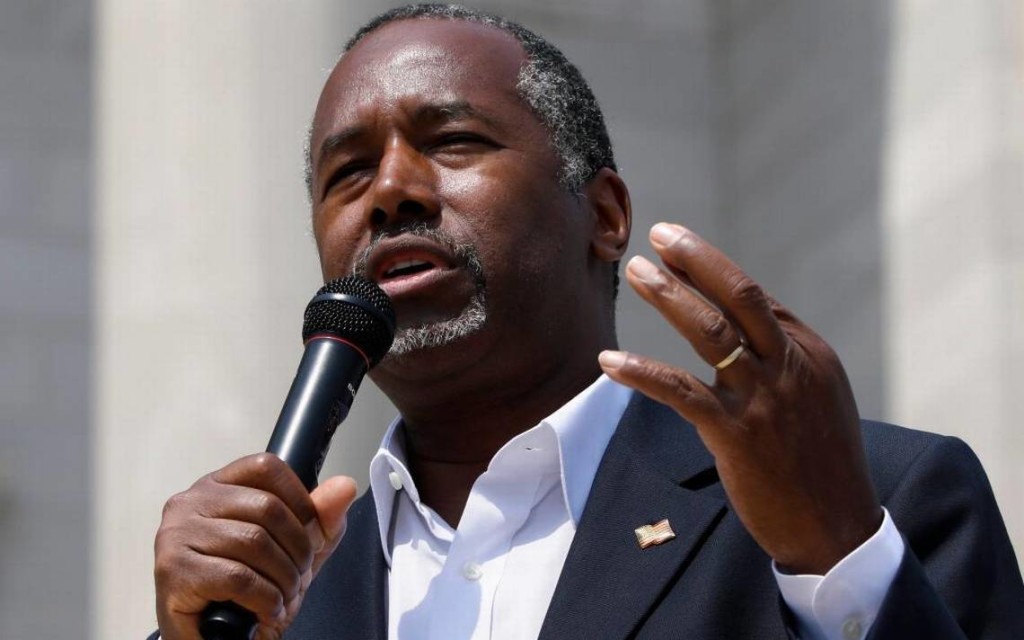
At 27 percent nationally, Donald Trump maintains his frontrunner status among Republican primary voters, but Ben Carson is now close behind him, a new CBS News/New York Times poll finds. Carson’s support has risen significantly since early August, from 6 percent then, to 23 percent now, putting him in second place. John Kasich and Carly Fiorina have also seen their support rise in this poll, although both remain in single digits. Some candidates have not fared as well, losing support since August. Jeb Bush (six percent) and Scott Walker (two percent) have now dropped into single digits in this poll. Rick Perry, who announced he was withdrawing his candidacy while the poll was in progress, receives just one percent of Republican primary voters’ backing. Trump appeals to many different types of Republican primary voters – but Carson is now a strong challenger among these groups of voters as well. Trump has a slight edge among the most conservative voters, while the race is close among women and Tea Party supporters. Trump holds a larger lead among men and evangelical voters. And while Trump leads Carson among voters who have not graduated from college, 30 percent to 19 percent, among college graduates, Carson has 29 percent to Trump’s 21 percent. More here.
New Iowa poll has Jeb Bush in 4th place, Marco Rubio tied for 5th place
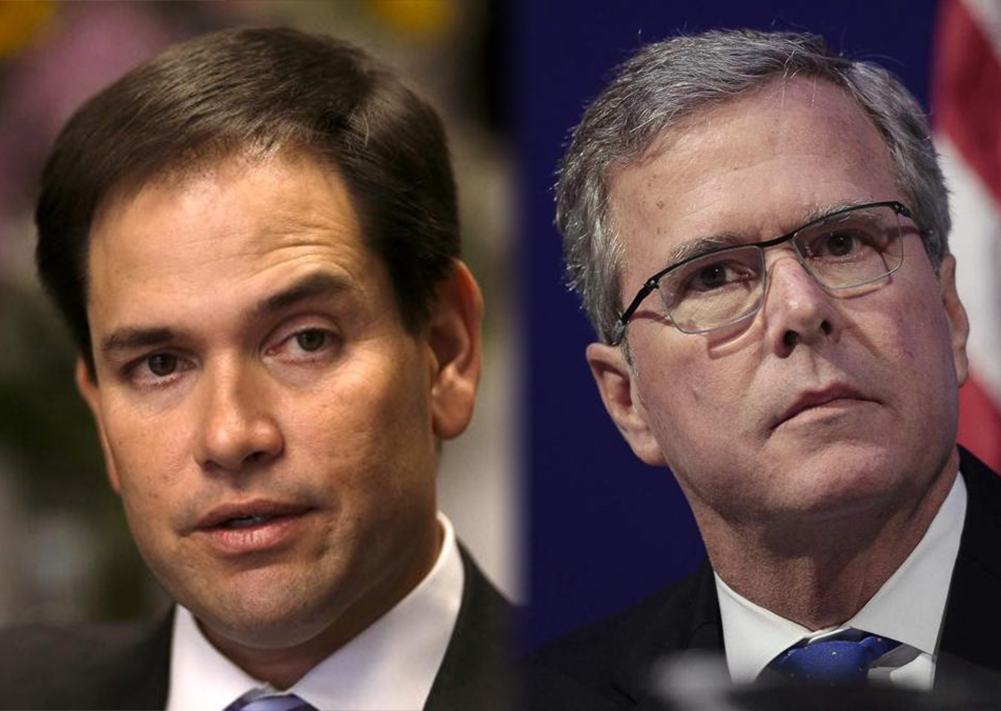
Jeb Bush and Marco Rubio continue to struggle in the polls – this time in a new Quinnipiac survey of voters in Iowa, the site of the first election in the Republican race for president. As has been the case in recent polls, Donald Trump and Dr. Ben Carson lead the field. Trump is at 27 percent in the Hawkeye State, while Carson is just six percentage points behind with 21 percent. Texas Senator Ted Cruz is next with 9 percent. Then comes Bush in fourth place with 6 percent. Rubio follows next with 5 percent, where he’s tied with Former Hewlett-Packard executive Carly Fiorina and Ohio Gov. John Kasich. Kentucky Sen. Rand Paul and former Arkansas Gov. Mike Huckabee both are at 4 percent. Then the shocker: Wisconsin Governor Scott Walker is down to just 3 percent in the survey. That’s a 15-percentage point drop in two months in the Quinnipiac survey. Walker has been at the top of many Iowa polls for most of the year, but no candidate appears to have suffered more from the rise of Donald Trump than Walker, who had been predicted by many pundits before the campaign to begin to be one of the most promising candidates to win the nomination. “The Iowa Republican Caucus looks like a two-man race in which the Washington experience that has traditionally been a major measuring stick that voters have used to choose candidates is a now a big negative,” says Peter A. Brown, assistant director of the Quinnipiac University Poll, speaking of the rise of Trump and Carson. However, 25 percent of likely caucus-goers also put Trump at the top of the list of candidates they would definitely not support, followed by Bush at 23 percent and Chris Christie at 14 percent. Trump has a 60-35 percent favorability rating among likely GOP Caucus participants, but Carson has a 79-6 percent favorability rating. Quinnipiac polled 1,038 likely Republican caucus-goers in Iowa via landlines and cellphones, with a margin of error of plus or minus 3 percentage points.
Presidential Primary Brief: 428 days until Election Day
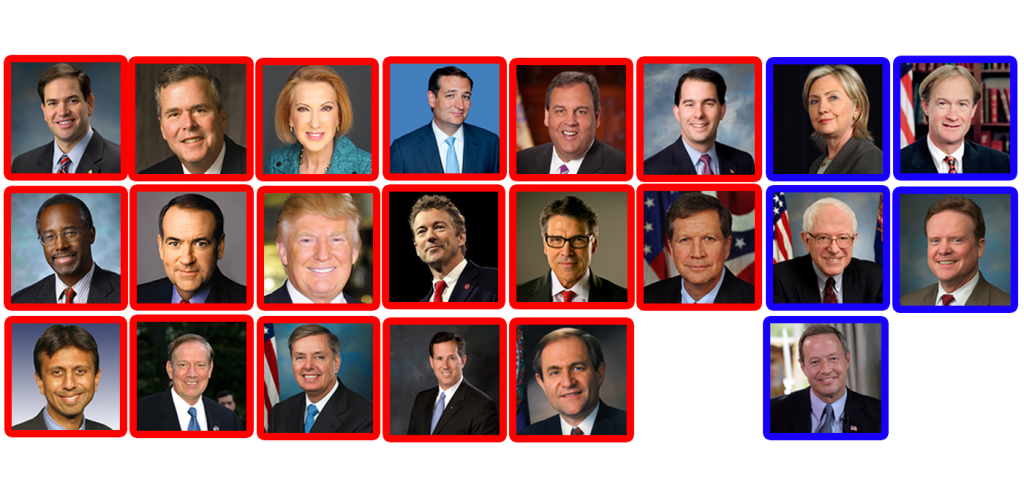
174 days until AL Presidential Primary 428 days until Election Day Convention Dates: Republican July 18-21 2016, Democratic July 25-28 2016 Weekly Headlines: Democratic support for Hillary Clinton at lowest since 2012 Iowa poll: Trump, Carson lead GOP race Ex-Clinton staffer who set up email server to invoke Fifth Amendment Press Clips: A look at union’s roles in the 2016 election (RTV-‐6 News 9/6/15) Presidential candidates are going after labor unions this election cycle, whether they’re trying to garner their support. “We’re going to get new laws to make sure your organizing and collective bargaining is respected again,” Clinton said to the International Association of Machinists and Aerospace Workers union….or get rid of them altogether. “On the national level, who deserves a punch in the face?,” CNN’s Jake Tapper asks. Mike Huckabee to visit Kentucky clerk Kim Davis in jail (CNN 9/3/15) Republican presidential candidate Mike Huckabee is planning to visit the Kentucky clerk taken into custody for refusing to issue marriage licenses to same-‐sex couples next week. Huckabee will visit Kim Davis, the Rowan County clerk, in jail Tuesday before he is set to rally supporters outside the detention center where she is being held, Huckabee spokesman Hogan Gidley told CNN on Friday. Hillary Clinton’s favorability numbers have gone under water (Politico 9/2/15) Americans’ views on Democratic front-‐runner Hillary Clinton have gone under water, nearing an all-‐time low in ABC News/Washington Post polling, according to the latest survey released Wednesday. Clinton is seen favorably by 45 percent of Americans, a decrease of 7 percentage points since July, while 53 percent said they did not have a favorable view of the former secretary of state, an increase of 8 percentage points in the same time frame. The numbers are close to Clinton’s all-‐time low in the poll, when she took in just 44 percent in the spring of 2008. Perry pulls plug on New Hampshire (Politico 9/2/15) Rick Perry’s campaign is all but over in New Hampshire. The former Texas governor has no more paid staffers in New Hampshire as of Wednesday. The last paid staffer, Michael Dennehy, told WMUR reporter John DiStaso that he hadn’t been paid since June. Rick Santorum first 2016 hopeful to visit all 99 Iowa counties (NBC News 9/2/15) Pizza Ranch served dozens of pizza pies, a congratulatory message from Rep. Steve King played over the loud speaker, and kids draped in oversized “Rick Santorum for President” t-‐ shirts jumped and laughed on a corn-‐themed bounce castle. That was the scene that greeted presidential candidate Rick Santorum as he arrived in Island Park in Lyon County on Tuesday evening. Carly Fiorina likely headed for second GOP 2016 debate after CNN revises criteria to qualify (NY Daily News 9/2/15) Carly Fiorina is no longer being relegated to the kiddie table. CNN said Tuesday it was revising its criteria so that “any candidate who ranks in the top 10 in polling between Aug. 6 and Sept. 10 will be included” in the prime time Republican debate on Sept. 16. Fiorina has consistently polled in the top 10 of GOP candidates after delivering a standout performance in the Aug. 6 Fox News undercard debate for Republican presidential hopefuls. Bush steps up attacks on Trump (CBS News 9/2/15) Republican presidential candidates Jeb Bush and Donald Trump have been feuding for weeks, but now Bush is launching his most aggressive attack yet. One day after Trump mocked Bush for calling immigration “an act of love,” Bush released a video that questions Trump’s conservatism, and he used the billionaire’s own words to do it, reports CBS News national correspondent Chip Reid. “I’m very pro-‐choice,” Trump says in the video. The video highlights less-‐than conservative statements Trump has made in the past. “You’d be shocked if I said that in many cases I probably identify more as a Democrat,” Trump says. Inside Ben Carson’s quiet surge (CNN 9/1/15) Watch out Donald Trump. Here comes Ben Carson. While the bombastic real estate tycoon dominates much of the GOP field, the retired pediatric neurosurgeon with a calm bedside manner is quietly emerging as a serious presidential contender. Carson is tied with Trump for first place in a new Monmouth University survey of likely Iowa Republican caucus-‐ goers, with the rest of the field lagging by double digits. The Carson surge comes as Trump has set the terms of debate for the past two months, forcing other candidates to shift their focus and decide whether -‐-‐ and how -‐-‐ to fight back against his constant attack. Dick Cheney wants Joe Biden to run for President against Clinton (International Business Times 8/31/15) Former Vice President Dick Cheney made a peculiar suggestion during a CNN interview aired on Monday: He wants Vice President Joe Biden to throw his hat into the ring for the Democratic presidential nomination. Biden, who has been mulling a bid over the past couple of weeks, has said he will make his decision sometime in the next month. Cheney appeared on CNN’s “New Day” with his daughter Liz to promote their new book, “Exceptional: Why The World Needs a Powerful America,” which is reportedly very critical of President Barack Obama’s management of the U.S. military. As Biden considers a run, former Secretary of State Hillary Clinton has seen a slump in polls as the controversy surrounding her use of a private email server while at the State Department continues. Hillary Clinton to speak out in favor of Iran nuclear deal (CBS News 8/31/15) Democratic presidential frontrunner Hillary Clinton will speak in support of the nuclear deal with with Iran on September 9 -‐ the same day Republican candidates Ted Cruz and Donald Trump are headlining a rally in opposition to the deal. Clinton has previously voiced her support for the agreement. The speech next week will give her an opportunity to expand on her position and push back on Republican critics of the deal.


